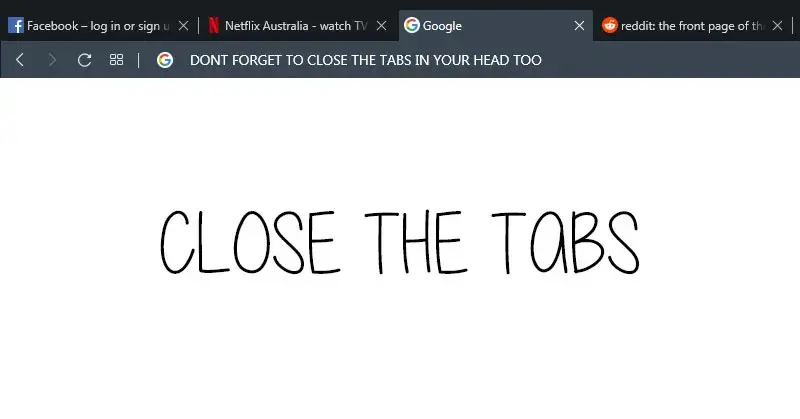
Close the Tabs
Like me, you probably have dozens of tabs open on your internet browser at any given time. Whether it’s an article you want to read later, podcast episode you want to listen to when you have a chance, or various email and social media accounts; your browser is likely cluttered with numerous and often unnecessary tabs- and your computer (brain) is working slower as a result!
Whilst some people are good at multi-tasking, most are not capable of being truly efficient whilst multitasking. Instead, our brains hop rapidly from one task to another, losing concentration every time we shift our attention.
This leaves us feeling exhausted and overwhelmed with all the multi-tasking in our lives. It might feel as if your ‘brain has too many tabs open.’ We have a huge number of simultaneous thoughts and ideas with an ever-growing to-do-list floating around in our heads. This is the mental health equivalent of having multiple browser windows open on your computer. Close them – you won’t miss them!
Now, that is easier said than done you might say. Here are some easy tips you can use to declutter your mind and close those open tabs in your head!
-
Try to limit multi-tasking.
Writing a to-do list will help you keep track of what needs to be done and will help you prioritize what needs to be done first. This will allow you to focus on one task at a time.
-
Create Healthy Boundaries.
When we take on too much, whether imposed by others or ourselves; we risk causing harm to ourselves. It is important to say ‘no’ sometimes. If we do not state our needs clearly, people get their needs met through us, which leads to a busier life for you. Try saying “I would like to help, but unfortunately I just cannot take on anything else at the moment” or “I understand that this is something you want me to do. However, can I show you what I have on so we can decide what you would like prioritized?”
-
Make space in your day to rest.
Running on empty will only get you so far. Just as your phone needs recharging, so do you! Studies show that taking ‘micro-breaks’ (5-15 minutes) improves your overall mental health and wellbeing. Something as simple as watching a funny video, reading a book on public transport, going for a walk, chatting to a friend or taking a snack break will help recharge your batteries. By implementing downtime into your daily schedule, you give yourself a chance to restore your energy levels.
-
Place importance on ‘me time.’
It is often easy to engage in activities that involve other people. In all the hustle and bustle, do not forget about you! Make sure you have some ‘me time’ and have a bath, go to the movies by yourself, read a book, listen to music… all in your own company. This might feel weird at first; however is a great way to slow down, relax and close a tab in your head.
-
Download a wellness app.
When you do not have the answers yourself and your feeling stressed, restless or experiencing difficulty sleeping, why not go to the experts that are right at your fingertips! Download a great app like Calm, Gratitude Happiness Journal or Smiling Minds. Alternatively, you can book an appointment with an MIT counsellor by emailing: counsellor@mit.edu.au
- Counsellors Team